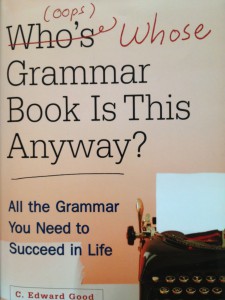
A voice is a voice (of course, of course), and no one should write in passive voice, of course. Yes, I dare go there: the long-standing “active voice versus passive voice” debate.
(My profound apologies to Mister Ed and Francis the Talking Mule. I don’t know what compelled me to do that…)
Of the many grammar-related articles I read, none are as opinionated as those offering advice about the active-versus-passive brouhaha. People don’t hesitate to throw their coins into this particular fountain.
We all prefer producing clear, concise content, especially when it’s a stepping-stone to leads and sales. Active voice good, passive voice bad. Fewer words à la Ernest Hemingway or Mark Twain good, an abundance of words à la James Joyce or Jane Austen bad. Succinct writing good, convoluted writing bad.
However: Passive voice can add intrigue or a poetic bent to your copy. But I’m not suggesting you generate endless paragraphs of passive-voice sentences. Let’s talk about it…
The Wisdom to Know the Difference … Between Active and Passive Voice: There’s no better way to explain these two written constructions than with example sentences.
Active Voice: Bloggers love Twitter retweets.
In active voice, the subject performs an action, not the object. The subject takes action, and the object receives it. In the above example, bloggers (the subject) take action by loving Twitter retweets (the object).
Passive Voice: Twitter retweets are loved by bloggers.
In passive voice, the sentence’s subject takes no action at all. The action belongs solely to the object. (Yep, bloggers do seem to wield such power on Twitter…)
The main reason grammarians and educators squawk about the passive voice is that it doesn’t express thoughts straightforwardly. When you read, it’s easier to absorb and understand active voice. Fewer words, less thinking…
Don’t equate passive voice with your lazy, unreliable cousin who forgot to pick you up from the airport. Passive voice is merely less direct. Unfortunately, passive voice gives a certain verb a bad reputation, and an unfair one at that.
The Verb “To Be” Isn’t Your Enemy–Make Friends with It: Yes, I admit it–I use this verb. But using the active form of “to be” in a sentence is no crime (there I go again!). I’ll let Grammar Girl do the explaining:
“For example, the sentence ‘I am holding a pen’ is in active voice, but it uses the verb ‘am,’ which is a form of ‘to be.’ The passive form of that sentence is ‘The pen is being held by me.’ Notice that the subject [in the second sentence], the pen, isn’t doing anything in that sentence. It’s not taking an action; it’s passive.”
In addition to some form of the verb “to be,” another clue that you’re traveling the passive-voice road is the word “by.” Now would be a good time to apologize to William Shakespeare’s favorite verb before reading any further…
The Passive Voice Was Good Enough for Thomas Jefferson and Strunk and White: Don’t believe the hype that you should avoid passive voice altogether. Our nation’s third president, a gifted writer, penned one of the most famous passive-voice sentences in American history:
“We hold these truths to be self-evident, that all men are created equal, that they are endowed by their Creator with certain unalienable rights, that among these are Life, Liberty, and the pursuit of happiness.”
If the underlined chunks had been written in active voice, would they retain their revered status? How about: “…that all men are equal, that their Creator endowed them with certain unalienable rights…”
Even my earliest grammar guide, Strunk and White’s The Elements of Style (Third Edition), uses passive voice WHILE EXPLAINING why you should write in active voice:
“Many a tame sentence of description or exposition can be made lively and emphatic by substituting a transitive in the active voice for some such perfunctory expression as there is or could be heard.”
(I don’t want to redirect your attention, but … enjoy Grammar Monster’s simple explanation regarding transitive verbs.)
The Boston Globe‘s Jan Freeman captured our modern confusion about passive-voice usage in a 2009 article she cleverly entitled “Active Resistance.” I highly recommend you read it.
Passive Voice Was Also Good Enough for Sherlock Holmes’s Creator: Still need more convincing that passive voice isn’t evil incarnate?
Mystery and crime/thriller authors use passive voice to inject uncertainty into a book’s plot, leaving you to wonder who did what to whom. By the book’s end, illumination and resolution should be yours. Sir Arthur Conan Doyle excelled at written passivity.
One tasty tidbit from Sir Arthur’s The Hound of the Baskervilles:
“No, your boy had been observed, and that gave me a guide where to look.”
The active-voice version is less intriguing: “Someone observed your boy, and that gave me a guide where to look.” (At this point in the novel, we still don’t know who did the observing…)
Yes, active voice is more direct and requires fewer words. But in Sherlock Holmes’s world of figuring out clues at the scene of the crime, passive voice rules.
Politicians Are Masters of Passive Voice–Just Ask George Orwell (and Ronald Reagan): In George Orwell’s 1946 essay Politics and the English Language, he railed against what he judged as politicians’ collective massacre of the English language for manipulative reasons.
Just before the essay’s conclusion, Orwell included a list of writing tips. Tip number four reads:
“Never use the passive where you can use the active.”
And yet, while critiquing the nefarious legislators of his time, Mr. Orwell liberally used passive voice. From the (brilliant!) man who wrote Nineteen Eighty-Four and Animal Farm:
“Political language … is designed to make lies sound truthful and murder respectable, and to give an appearance of solidity to pure wind.”
Impressive writing, even if George’s words clear the fence lethargically. But I don’t disagree with him about politicians and their use of passive voice as a rhetorical device.
Orwell’s final tip in the essay: “Break any of these rules sooner than say anything outright barbarous.” In other words, choose passive voice over outright cruelty…
President Ronald Reagan uttered these vague, non-apologetic words during his 1987 State of the Union address (upon admitting his administration’s involvement in the arms-for-hostages Iran-Contra scandal):
“We did not achieve what we wished, and serious mistakes were made in trying to do so.”
But Vice President George H. W. Bush beat Reagan to it (in 1986) with the more brief “Mistakes were made.” Here’s The Atlantic‘s delicious listicle regarding contemporary use of this politically passive phrase.
Movie Dialogue Demands an Active Voice (and a Bigger Boat): My final thought about active versus passive voice: Sometimes you feel like a passive nut, sometimes you don’t. However, active voice works best on the silver screen.
The “This Land Is Thailand” blog (thank you, Jason!) demonstrates why with the following examples:
- “Frankly, my dear, a d@mn is not given by me!” vs. “Frankly, my dear, I don’t give a d@mn.” (Gone With the Wind)
- “A bigger boat is going to be needed by you.” vs. “You’re gonna need a bigger boat.” (Jaws)
- “Dead people are seen by me.” vs. “I see dead people.” (The Sixth Sense)
- “The truth can’t be handled by you!” vs. “You can’t handle the truth!” (A Few Good Men)
What say you, dear readers? Do you (actively) avoid using passive voice in your business/marketing content?
Will you now carefully scrutinize your marketing collateral, blog posts, and other content for active voice? I’m not here to judge you. I’m just boldly going where many others have gone before…
Lori Shapiro is the owner of By All Writes LLC, a business-to-business (B2B) company in Marlton, New Jersey, that plies its trade via copywriting, editing, and other content-marketing services. She revels in shielding her clients from the time-consuming pain of writing their own print or web marketing and promotional copy.
Please call Lori Shapiro of By All Writes LLC at 856-810-9764 (or e-mail her via lori@byallwrites.biz) to schedule the gratis 20-minute consultation that will resolve your current copywriting or editing dilemma…








